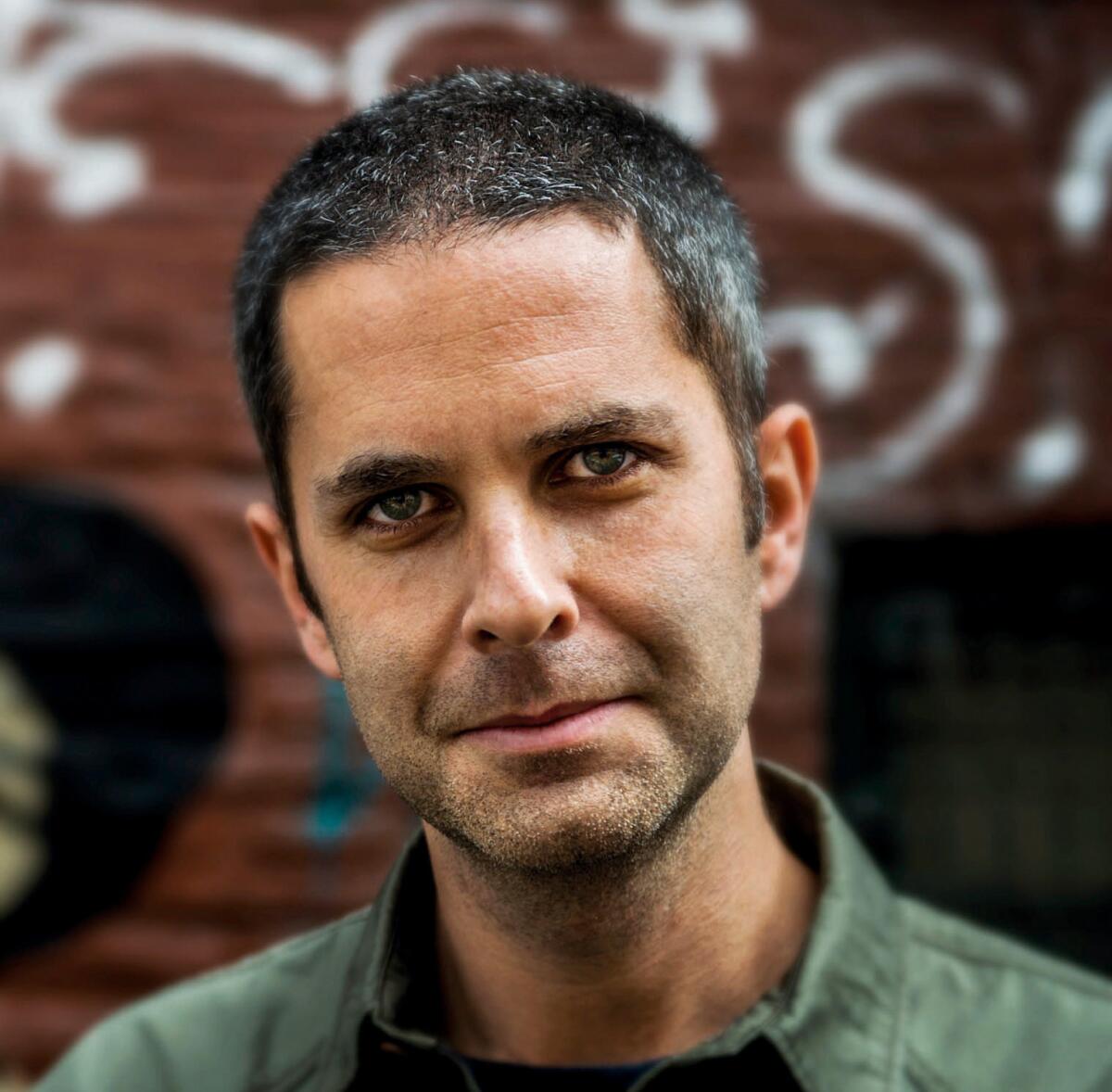Tom Rachman’s debut novel was a joyful triumph. In his fourth, cynicism seeps in

- Share via
Review
'The Imposters'
By Tom Rachman
Little, Brown: 352 pages, $29
If you buy books linked on our site, The Times may earn a commission from Bookshop.org, whose fees support independent bookstores.
In 2010, Tom Rachman’s debut novel, “The Imperfectionists,” vaulted the author to the literary fore — and with good reason. An ingeniously structured series of nearly stand-alone stories about the international staff of an English-language newspaper in Rome, the book brims with youthful exuberance, as if Rachman, who worked in Rome and Paris as a journalist, were discovering in real time his gift for wrangling the world into a narrative form that honors its bewildering complexity. It’s quite a feat, a joy to experience, and as a result, it became a bestseller widely published abroad. His two subsequent novels — “The Rise & Fall of Great Powers” and “The Italian Teacher” — are fine novels both, but they failed to capture the same excitement.
“The Imposters,” Rachman’s fourth novel, is a spiritual sequel to his first. It too features nearly stand-alone stories of an international cast that intertwine in surprising ways. It’s also about writers and the writing life. But if “The Imperfectionists” had the spirit of a wide-eyed college junior at a study-abroad program, “The Imposters” evinces the disappointment and cynicism of the program’s midcareer chaperones, who took these jobs because they too were once moved by the experience but have since grown bored — and therefore resent their open-minded charges.
At the center of “The Imposters” is Dora Frenhofer, a septuagenarian Dutch novelist who senses in herself signs of mental and physical decline, prompting her to take stock of the characters who have been in her orbit: her brother Theo, who vanished while on a solo trip to India as a teen; a delivery man who comes by her London home; an American novelist she met at a literary festival in Australia.
Josh Riedel’s debut novel ‘Please Report Your Bug Here’ tries to be both a sendup of circa-2010 Silicon Valley and a futuristic sci-fi cautionary tale.
Despite the global settings, the true stage here is the novelist’s page: Dora imagines herself into the perspectives of family, friends, ex-lovers and strangers, repurposing their lives for personal ends. In the opening chapter, we meet Dora’s husband, Barry, a divorce lawyer turned marriage counselor, whom she wed late in life because she wanted someone to “monitor her, and tell her when to act” — meaning to end her own life.
Dora’s father suffered from dementia, and she plans on avoiding his fate. During a discussion about her mental agility, Dora waits for Barry to come downstairs, imagining what he’ll say as she does. But then, this passage: “Nobody comes downstairs. Nobody is upstairs, or anywhere in this house. Only Dora, pondering a fictional character, this husband Barry, based on someone she met in passing once, and written into a story that isn’t quite working.”
The stories Dora tells, then, are not exactly autobiographical; rather, they record the various concerns and emotions and regrets of her existence. In between the longer third-person chapters are short sections in the first-person. “These sentences are fact,” Dora informs us, “I’m writing as myself. … But every other chapter will describe another character.” Though these characters take inspiration from people in her life, you read them as a sort of autofiction within Rachman’s fiction: interpretations, interpolations and interrogations of herself.
Yet it’s impossible to know how Dora is employing these figures and these plots — a fun but at times predictable tactic. Her looming presence throughout can sometimes distract the reader from the plot, and her self-conscious artifice risks undermining these otherwise convincing characters. But the gambit ultimately contributes to a powerful finale.
Your ultimate L.A. Bookhelf is here — a guide to the 110 essential L.A. books, plus essays, supporting quotes and a ranked list of the best of the best.
One chapter features a former lover of Dora’s, a Jewish American food writer with whom she tagged along to “exquisite dining” excursions in Paris in her early 20s. The food writer, Alan, still lives in Paris with his and Dora’s 50-something son, Benjamin. Dora fretted over the health of the fetus, as “the suffering of a handicapped child was more than Dora could contemplate.” Alan dissuaded her from having an abortion, but shortly after giving birth to Benjamin, she left Alan to raise the boy himself. Or did she? Dora later reveals that she did in fact have the abortion and never saw Alan again. He had died of a stroke in 1997, “leaving no survivors.”
Dora has turned the tale of a youthful fling into an exploration of her choices, coming to no obvious conclusions. Even in her fictional account, she abandons the baby. Rather, her story asks how her child might have fared, and how this would have fundamentally altered Alan’s eternal bachelorhood, and how they both might have felt about Dora. Imagining the biography of a child you didn’t have is a common trope, but Dora isn’t conjuring these figures because she feels guilty about Benjamin. She is simply deeply melancholy after learning that Alan, her brief beau, ended up alone.
A woeful tale, “The Imposters” directs its most pointed cynicism toward the writer’s life. Besides Dora, who can no longer find a publisher for her work, and Alan, who retired after the glossy magazines all folded, Rachman’s novel is populated by anguished authors lamenting their lack of success. Danny Levittan, an American novelist in his 40s who spends almost a decade on a magnum opus no one cares about, suffers humiliation after humiliation. In one very funny scene, he reads before a tiny audience at a literary festival — booked at the same time as Malala Yousafzai, who evokes loud cheers and applause next door. Even an effective section that initially has nothing to do with the literary scene — a harrowing depiction of wrongful imprisonment and torture in an unnamed country — soon goes that way when the survivor of that horror foists his memoir of the experience on an acquaintance.
“Second Place,” Rachel Cusk’s first novel after the radical, brilliant “Outline” trilogy, follows a forceful woman who’s had enough of difficult men.
Ultimately, the most writerly creation is Dora herself. The novel’s organizing principle, she seems less an authentic portrait of an aging writer than the projection of a younger writer’s fears about aging. Her bleak assessment of her life and career and the fact that nothing much appears to happen after middle age — these resonate more with a 40-year-old character like Danny. The creeping sense that Dora is what a writer like Danny or Alan — or Rachman — worries they’ll become punctures the emotional significance of her lonely and unheralded old age. “The Imposters” purports to feature characters of Dora’s creation, but in truth it’s the other way around: She’s the imposter.
Clark is the author of “An Oasis of Horror in a Desert of Boredom” and “Skateboard.”
More to Read
Sign up for our Book Club newsletter
Get the latest news, events and more from the Los Angeles Times Book Club, and help us get L.A. reading and talking.
You may occasionally receive promotional content from the Los Angeles Times.








